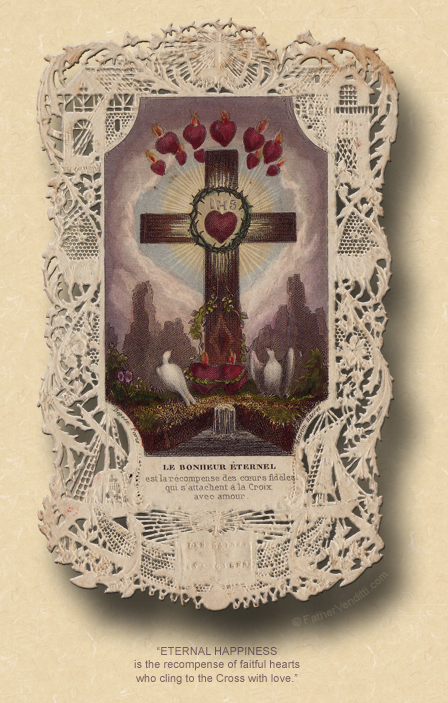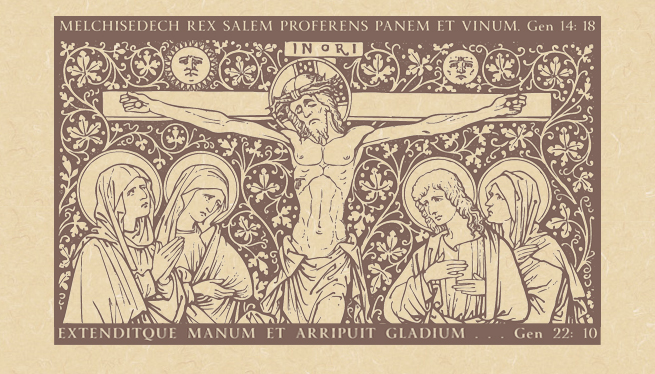Anyone Who Looks for God Far from the Cross Will Never Find Him.
The Twenty-Second Sunday of Ordinary Time.
Lessons from the primary dominica, according to the ordinary form of the Roman Rite:
• Jeremiah 20: 7-9.
• Psalm 63: 2-6, 8-9.
• Romans 12: 1-2.
• Matthew 16: 21-27.
The Thirteenth Sunday after Pentecost.
Lessons from the dominica, according to the extraordinary form of the Roman Rite:
• Galatians 3: 16-22.
• Psalm 73: 20, 19, 22.
• Luke 17: 11-19.
The Thirteenth Sunday after Pentecost; the Feast of the Holy Martyr Anthimus, Bishop of Nicomedia; the Feast of Our Venerable Father Theoctist, Companion of Saint Euthymius the Great; and, the Feast of the Holy Deaconess Pheobe of Cenchreæ.
First & third lessons from the pentecostarion, second & fourth from the menaion for the Martyr, according to the Ruthenian recension of the Byzantine Rite:
• I Corinthians 16: 13-24.
• Hebrews 13: 7-16.
• Matthew 21: 33-42.
• John 10: 9-16.
FatherVenditti.com
|
 10:15 AM 9/3/2017 — Today’s Gospel lesson presents something of an enigma: it was only last Sunday that we heard our Lord heaping praise upon Peter because he had recognized Jesus as “the Christ, the Son of the living God" (Matt. 16: 16), and for which he was rewarded by being given the metaphorical keys to the Kingdom of Heaven, establishing the foundation of the modern papacy. Today’s lesson is a continuation of the same scene, and all of a sudden Jesus is calling Peter “Satan.” So, what has changed in the few verses that separate these too seemingly opposite attitudes? 10:15 AM 9/3/2017 — Today’s Gospel lesson presents something of an enigma: it was only last Sunday that we heard our Lord heaping praise upon Peter because he had recognized Jesus as “the Christ, the Son of the living God" (Matt. 16: 16), and for which he was rewarded by being given the metaphorical keys to the Kingdom of Heaven, establishing the foundation of the modern papacy. Today’s lesson is a continuation of the same scene, and all of a sudden Jesus is calling Peter “Satan.” So, what has changed in the few verses that separate these too seemingly opposite attitudes?
What’s changed is in the opening verse of today’s lesson: “From that time onwards Jesus began to make it known to his disciples that he must go up to Jerusalem, and there, with much ill usage from the chief priests and elders and scribes, must be put to death, and rise again on the third day” (v. 21 Knox). The word to focus on in that sentence is the word “must.” It’s not an option. In the Greek, the phrase is ὅτι δεῖ αὐτὸν, “it behooves him” to go. It’s the imperative tense. There is no choice, He must go and suffer these things because this is the very reason God came to earth as a Man in the first place.
The Apostles didn’t understand this sort of talk at all, because they still thought of the Kingdom of God in political terms. That’s why Peter tries to dissuade our Lord from the way of the Cross: because if Christ is killed, then who’s going to overthrow the Romans and lead Israel into freedom at last? Saint John Chrysostom says, “Peter reasoned in a human fashion, and concluded that all Christ’s talk of his Passion and Death were demeaning and unbecoming for Him” (Homilies on St. Matthew, 54, 4).
Peter views Christ’s earthly mission far too humanly, and so fails to recognize that it was manifestly the will of God that the Redemption would be wrought through the Cross, that—in the words of Saint Augustine—“there was no more suitable way to rescue us from our misery” (De Trinitate, 12, 1-5). In Cæsarea, Peter had spoken under the impulse of the Holy Spirit when he declared Christ the Son of the living God; but, today he has relapsed into a totally materialistic perspective.  The notion that the Cross, mortification, sacrifice, are in some way good and a means of salvation, will always strike a discordant tone with those who, like Peter on this occasion, view things from a worldly point of view. Saint Paul had to continually warn the early Christians about people “whose lives make them the enemies of Christ’s cross. Perdition is the end that awaits them, their own hungry bellies are the god they worship, their own shameful doings are their pride; their minds are set on the things of earth…" (Phil. 3: 18-19 Knox). The notion that the Cross, mortification, sacrifice, are in some way good and a means of salvation, will always strike a discordant tone with those who, like Peter on this occasion, view things from a worldly point of view. Saint Paul had to continually warn the early Christians about people “whose lives make them the enemies of Christ’s cross. Perdition is the end that awaits them, their own hungry bellies are the god they worship, their own shameful doings are their pride; their minds are set on the things of earth…" (Phil. 3: 18-19 Knox).
If we’re only able to view the circumstances of our lives in worldly terms, then it’s practically impossible to appreciate that pain and suffering—or anything, in fact, that requires effort—can be worth while. On the other hand, we know by experience that the difficulties we face along the way can serve to purify and strengthen us and make us better. We all aspire to happiness because we’re made that way, it’s part of our nature. But what is the happiness to which we aspire? It is an earthly happiness to be found in the here and now, or is it the happiness of an eternal life lived in the presence of our Maker and Redeemer?
Faith enables us to see and realize that without sacrifice the soul encounters no true love, no genuine joy, no lasting purification and no possession of God. The path to holiness passes through the Cross. The crosses that each of us face each and every day—crosses of frustration, crosses of lost love, crosses of difficult relationships, crosses of material hardship, crosses of illness, or whatever they may be—are, in the words of Pope Saint John Paul, the “living book in which we learn definitively who we are and how we ought to behave. This book is always open before us” (Address, April 1, 1980). Every day we have to approach and read it. And in it we learn who we are, who Christ is, the greatness of His love for us, and how best to follow Him.
Anyone who looks for God without sacrifice, without the Cross, will never find Him.

|

